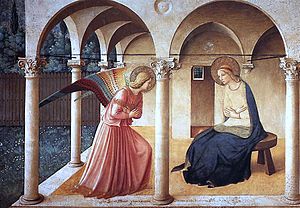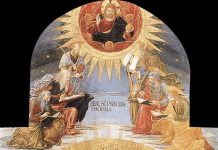A blessed solemnity of the Annunciation, to all our readers! This feast commemorates the conception of the Son of God in the womb of the Blessed Virgin, freely chosen by the young Hebrew maiden Mary, who was given a choice to make:
Fiat mihi secundum verbum tuum,
May it be done to me according to thy will.
This act, and the mission that followed therefrom – to be the Mother of God – was freely chosen by the young Hebrew maiden Mary, Her response should be our own, to anything manifested as the will of God – poignant in these times – whether through an angel of light, or any of the ‘messengers’ of providence whom we may meet in our daily journeys. As Saint Augustine wrote, Mary conceived Christ in her heart before she conceived Him physically.
How can this be, since I know not man?
Tradition teaches that she was a virgin, consecrating herself by vow, thus, in all expectation, foregoing and offering up her opportunity to be the mother of the Messiah.
Yet God often does the unexpected, and chooses the lowly, the meek, the humble, and those who trust most in Him. For the apparent wisdom and strength of the world are not His wisdom and strength, which far surpass anything we could think or hope.
As Pope Saint John Paul II said in his homily on this Solemnity in Nazareth in the Jubilee Year:
Like Abraham, Mary is asked to say yes to something that has never happened before. Sarah is the first in the line of barren wives in the Bible who conceive by God’s power, just as Elizabeth will be the last. Gabriel speaks of Elizabeth to reassure Mary: “Know this too: your kinswoman Elizabeth has, in her old age, herself conceived a son” (Lk 1:36).
Like Abraham, Mary must walk through darkness, in which she must simply trust the One who called her. Yet even her question, “How can this come about?”, suggests that Mary is ready to say yes, despite her fears and uncertainties. Mary asks not whether the promise is possible, but only how it will be fulfilled. It comes as no surprise, therefore, when finally she utters her fiat: “I am the handmaid of the Lord. Let what you have said be done to me” (Lk 1:38). With these words, Mary shows herself the true daughter of Abraham, and she becomes the Mother of Christ and Mother of all believers.
Fiat mihi secundum verbum tuum, which should also be our response to anything manifested as the will of God, whether through an angel of light, or any of the ‘messengers’ of providence whom we may meet in our daily journeys. As Saint Augustine wrote, Mary conceived Christ in her heart before she conceived Him physically.
This Solemnity was held in such veneration that until 1582 it was the official beginning of the new year. Fitting, as March 25th was also the traditional day of Christ’s crucifixion, as well as the creation of the world. But we still count the years from Christ’s birth.
Et homo factus est – and the Word was made Man, the high point of our Creed, and of our history.
O Virgo Maria, ora pro nobis semper.












